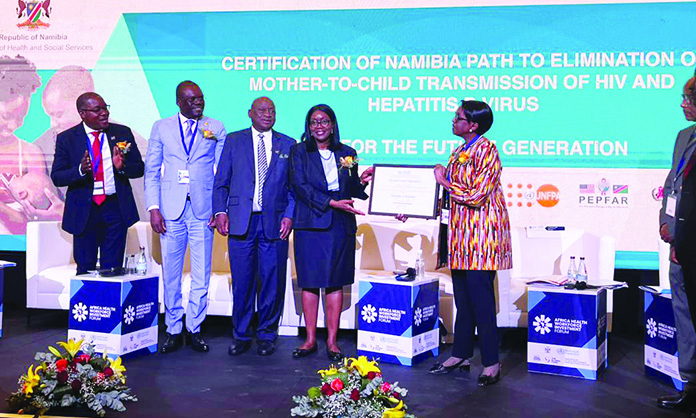The World Health Organisation (WHO) has presented Namibia with meritorious awards for the country’s remarkable performance lowering mother-to-child transmission of HIV and reducing hepatitis B.
Based on set criteria, the WHO has awarded Namibia a ‘silver tier’ status for progress on reducing hepatitis B, and a ‘bronze tier’ for the significant reduction of HIV.
The WHO says Namibia has become the first country in Africa to reach such a significant milestone.
“This is a landmark achievement by Namibia that demonstrates the life-saving possibilities of committed political leadership and effective implementation of public health priorities,” Matshidiso Moeti, the WHO’s regional director for Africa, said yesterday.
Meanwhile, health and social services minister Kalumbi Shangula has raised concern over Namibia’s doctor-to-patient ratio.
Shangula said this at the Africa Health Investment Forum underway at the Mercure Hotel in Windhoek this week.
“According to a study . . . by the World Health Organisation (WHO), the African continent has a ratio of 1,55 healthcare workers for every 1 000 people,” he said.

Shangula said this is considerably low, given the WHO threshold of 4,45 healtcare workers per 1 000 people in Africa.
The minister said this serious shortage in Africa undermines access to provisional health services on the continent.
Shangula lauded countries in the region which have made commendable efforts in improving their healthcare systems for their workforces.
He acknowledge the struggles faced by healthcare workers, ranging from suffering from burnout due to long hours to dealing with a “disproportionate” number of patients.
“These challenges make it difficult for the public health system on the continent to provide responsive, comprehensive and high-quality healthcare to all citizens – particularly in the more underserved areas,” Shangula said.
He said these challenges are due to migration, limited resources and a lack of training facilities.
Addressing these shortcomings requires a multifaceted approach, he said.
Shangula said the number of Africans who have migrated to other countries for better opportunities needs to be addressed to see a shift.
“It is a matter that needs to be addressed as a top priority for African governments,” he said.
Shangula highlighted Namibia’s stance on the importance of having an efficient and functional healthcare workforce to achieve the United Nations Sustainable Development Goals.
He said the ministry has commissioned a situational analysis and health labour market projection to inform the development of a national human resource for health strategic plan.
“The plan is designed to guide healthcare interventions as part of the ethos to achieve our priorities actuated in the fifth National Development Plan, the second Harambe Prosperity Plan and Vision 2030,” Shangula said.
COVID LOSSES
Speaking at the same event, health and social services executive director Ben Nangombe said the protection of healthcare workers is pivotal in healthcare development in Namibia.
“We believe that investing, shielding and protecting the workforce is vital,” Nangombe said.
The objective of the Africa Health Workforce Investment Forum is to formally launch the African Health Workforce Investment Charter and to secure commitments to investment and action.

‘FEET ON THE GROUND’
Prime minister Saara Kuugongelwa-Amadhila said the government is taking steps to realise universal health coverage and build a resilient healthcare system to which everyone, everywhere in Namibia could have access.
“Any discussion about the delivery of healthcare services must acknowledge that for these services to be rendered and rendered effectively, we need feet on the ground.
“We need dedicated men and women who must put in the hours and sweat to care, to treat and to manage patients and clients who present to health facilities,” she said.
The prime minister said for health professionals to do their work effectively, they must be well resourced and empowered in the best way possible.
“It is thus important to ensure that governments make the necessary investments – not only in the public health systems overall, but specific attention must be given to strengthening the healthcare workforce.
“Without a well-resourced healthcare workforce, there can be no effective and high-quality healthcare services,” she said.
Kuungongelwa-Amadhila said in many African countries healthcare workers face a myriad challenges – they have to work long hours, causing burnout, among others.
“There is a lack of experienced professionals who render training to the younger cadres entering the different healthcare disciplines,” she said.
She said the remuneration packages at many public healthcare facilities do not compare well with those offered in the private sector.
‘BRAIN DRAIN’
“As a result, public healthcare services bleed heavily as professionals depart for perceived greener pastures.
“On top of that, the perceived greener pastures are found thousands of miles away on other continents. Hence, the phenomenon known as the ‘brain drain’ has decimated public healthcare systems in many African countries,” Kuugongelwa-Amadhila said.
Stay informed with The Namibian – your source for credible journalism. Get in-depth reporting and opinions for
only N$85 a month. Invest in journalism, invest in democracy –
Subscribe Now!






